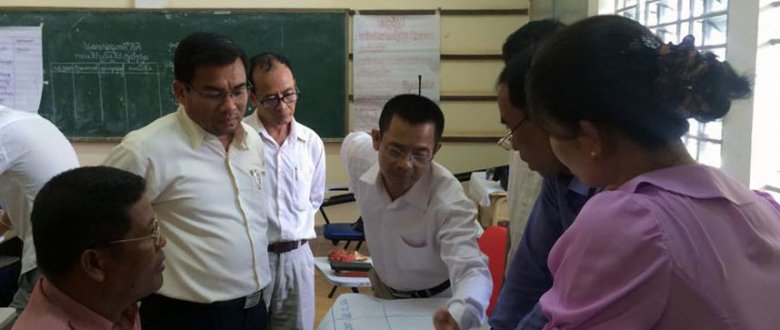
A system of trainings and follow-up activities
VVOB believes that to develop human capacity you need an array of methods and a phased approach in which follow-up plays an important role.
Trainings are often a first step in a development process. They strengthen the participants with knowledge, skills, tools and know how. As these strengthened elements are being applied on the job, follow-up activities make it possible to monitor how the application phase is progressing. They allow us to check the quality of the changes that are being implemented. It also gives us feedback on the level of understanding of the training content and the achievability of these changes as seen by the participants. The information gained during these follow-up activities makes it possible to offer on-the-spot support or even steer in a better direction.
To strengthen the Teacher Training Department’s and the Provincial Teacher Training Centres’ (PTTCs) capacity in planning, monitoring and evaluation towards more professional development the MoEYS-VVOB programme chose to work with Capacity Development Support Teams (CD Support Team) in the follow-up phase.
Explaining the Capacity Development Support Teams
Change within an organisation affects everyone and thus calls on everyone’s engagement. Asking people to change the way they work, to implement new tools and to use their time differently requires a driving support base on every level of the organisation. That’s where the CD Support Teams come into the picture.
Every PTTC has its own CD Support Team. These teams consist of six people from the three main levels of the organisation: two teacher trainers, two members of school management and two members of the Provincial Office of Education.
They are the go-to people for all the colleagues in the school. They offer information on the new tools and processes, as well as support.
Their drive in the change process is crucial to implement, support and consolidate the changes.
VVOB brings these teams together every few months to discuss the progress they are making in their schools. They share what obstacles they encounter and what actions have delivered them good results. The team members are supported by their peers, strengthened in the importance of their role and depart from the meeting with a bag of interesting ideas on how to assist their colleagues once back at the school.
Learning from each other through follow-up meetings
During the follow-up sessions in June-July the CD Support Teams came to realise that they all face the same struggle when they try to implement the professional development tools and processes. That struggle is the difference in motivation between the older generation and the younger generation of teacher trainers. Generally speaking, the older generation seems to be less engaged in their profession and therefore less interested in undertaking action to further develop themselves professionally.
The PTTC directors are having a hard time convincing these less engaged teacher trainers of the benefits and effects of strengthening their capacities as a teacher. This discrepancy in engagement has its effect on the entire teaching staff and was therefore elaborately discussed during the follow-up meetings.
While the directors talked about their approaches to this situation, the teacher trainers described how the situation is perceived from their perception as teaching staff. The members from the Provincial Office of Education reminded the directors of the official and legal measures at their disposal.
Putting all these experiences and options together taught the CD Support Teams that a mixed approach seems to be fruitful. On the one hand it’s important to keep offering positive support to the less engaged teacher trainers while on the other hand monitoring them closely and responding consistently to unwillingness are the way to go.
Article written by Karolina Rutkowska, Education Advisor (Quality Assurance)




